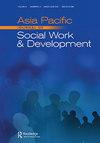2019冠状病毒病及其对非正规部门工人的影响:以泰国为例
IF 1
4区 社会学
Q3 SOCIAL WORK
Asia Pacific Journal of Social Work and Development
Pub Date : 2020-10-16
DOI:10.1080/02185385.2020.1832564
引用次数: 39
摘要
非正式部门(IS)工人占泰国劳动力的很大比例,对泰国经济做出了重大贡献。然而,IS工人几乎没有社会保障,在经济上被边缘化,这使他们特别容易受到政府为应对COVID-19大流行而关闭泰国经济的影响。研究人员对384名IS员工进行了抽样调查,发现IS员工的月收入急剧下降,尽管这种下降在不同的职业和地理区域有所不同。为了弥补收入的减少,IS工人动用了他们的储蓄,增加了他们的债务。泰国政府在政府停摆期间为工人提供收入支持的项目只惠及不到一半的IS工人。社会工作者可以帮助为IS工作者提供更好的社会保护,使其免受大流行加剧的社会排斥。本文章由计算机程序翻译,如有差异,请以英文原文为准。
Covid-19 and its impact on informal sector workers: a case study of Thailand
ABSTRACT Informal sector (IS) workers comprise a significant proportion of the Thai work force and contribute significantly to the Thai economy. Nevertheless, IS workers have little social protection and are economically marginalised, making them especially vulnerable to the effects of the government’s shutdown of the Thai economy to address the COVID-19 pandemic. Using a sample of 384 IS workers, researchers found that IS workers experienced dramatic decreases in their monthly income, although the reduction varied across occupation and geographic region. To compensate for reduced income, IS workers tapped their savings and increased their debt. A Thai government programme to provide income support for workers during the shutdown reached less than half of IS workers. Social workers can help provide better social protection to IS workers from pandemic-amplified social exclusion.
求助全文
通过发布文献求助,成功后即可免费获取论文全文。
去求助
来源期刊

Asia Pacific Journal of Social Work and Development
SOCIAL WORK-
CiteScore
4.10
自引率
5.00%
发文量
21
 求助内容:
求助内容: 应助结果提醒方式:
应助结果提醒方式:


